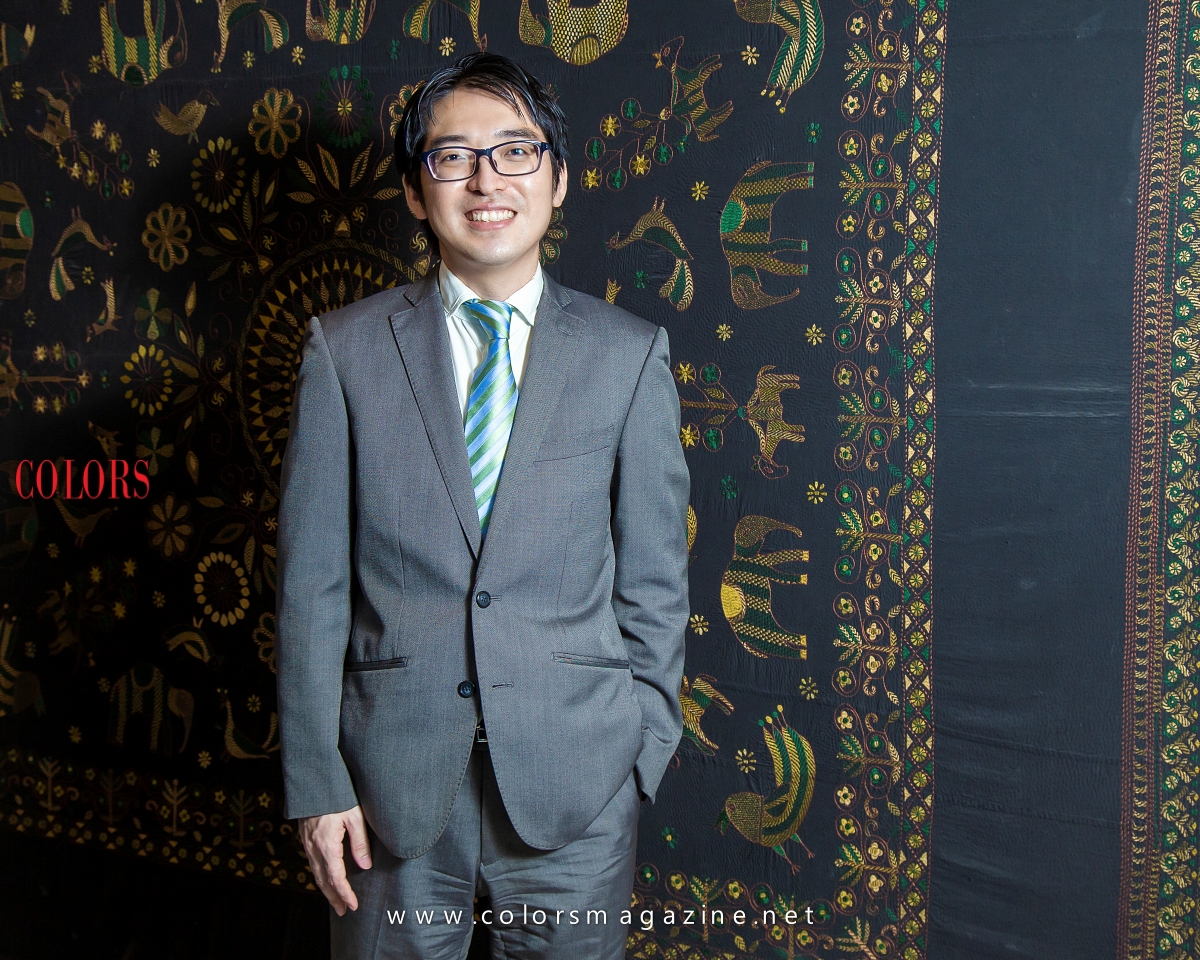Blossoming Relations
From 83 Japanese companies operating in Bangladesh in 2010 to 321 companies in the span of 11 years is a testimony of the growing interest of Japanese companies in Bangladesh as a major investment destination. Japanese entrepreneurs have invested in ready-made garments, textile, IT and infrastructure and eyeing the country’s strong consumer market as the next investment trajectory. Advisory editor of Colors Ziaul Karim and feature writer Arka Dev Biswas caught up with the country representative of JETRO Yuji Ando to understand what has contributed to the surge in Japanese investment interest in Bangladesh and how JETRO is taking care of Bangladesh-Japan business interest and connectivity.

Booms unfolding
Japan External Trade Organization (JETRO) has been promoting investment and trade in Bangladesh as the official organization under the government of Japan. JETRO was established in 1958 and started in Bangladesh in 1973. The vision lives by is to provide mutually beneficial trade and investment opportunities between Japan and Bangladesh. Between 2010 and 2021 Japanese companies have increased four-fold, increasing to 321, from a mere 83 companies back in 2010. This upscaling in investment stems from how Bangladesh is seen as a point of interest for Japanese companies.
Yuji Ando has been actively participating in building Japanese relations in Bangladesh since 2010. Similar to other expats, Ando has seen fundamental changes in how Bangladesh has grown on both at micro level and macro level. “Previously we had to bring our favourite goods from Japan, as we did not get it in Bangladesh. Whereas now, we can get it in any supermarket. These changes have been so much easier for expats like us, and we feel the adulation.” The variation in goods available have been tectonic, especially for Japanese and other Asian expats. The significant development of infrastructure and communication has also curbed the time to commute. “Previously travelling from the airport to like Gulshan used to take around two hours. And now it takes just twenty minutes. It’s amazing how development has been exponential, in terms of infrastructure. I have also started to love Bangladeshi dishes, especially khichuri, illish and all the other delicacies.” The infrastructure and communication development played a massive role in developing Bangladesh, however, for Yuji Ando something else has remained the same. “The people are still the same they were 10 years ago. They were friendly, welcome and hospitable back then, they still are, and for me this is the true sign of growth. Staying true to one’s root, despite of significant changes all around.”

Land of the Opportune
The man from the land of the rising sun, Yuji Ando sees opportunities that others may not easily notice. His economics background and his love for working for developing nations gives him the lens to see the potential of countries like Bangladesh. “The scope for development in Japan is very limited, as it is already saturated. Developing on top of it, will not have significant changes, rather very marginal to almost none. Developing nations on the other hand, can experience exponential growth with marginally small inputs.” Yuji Ando is excited for the development of trade relations and investments that Bangladesh and Japan are building.
Bangladesh being an RMG dependent nation, meant that other sectors did not receive the priority that they should have. After 2014, former Japanese Prime Minister Shinzō Abe vowed to enable yen loans to Bangladesh, to help develop the infrastructure in Bangladesh. The IT sector has potential, all it requires is guidance and proper grooming, Yuji Ando identifies. Japanese tech companies view this as an opportunity to help improve the tech industry, thanks to the vast number of engineers Bangladesh produces.
Japanese companies specifically inquire about the potential of various sectors in Bangladesh. The Fast-moving consumer goods (FMCG) sector, the tech industry, RMG and other sectors. Prior to this, inquiries were more general in nature, like GDP, population, demography, etc. Now companies ask about the market structure, the potential of various markets, and how market penetration can be achieved for Japanese companies. “We do our best to provide clear information regarding Bangladeshi companies, the markets, the potential of the market as a whole. Regarding local companies, it is difficult to give transparent information as many of the companies are not even listed. Thus, this hinders our ability to provide sufficient and clear information.” As Japanese companies do not have the luxury to conduct feasibility studies or conduct due-diligence surveys, it becomes to see the viability of investments in markets.
Grooming the culture of symmetry and disclosure of information is essential for the business practices to be aligned with each other. The business cultures differing has not allowed investors to fully give in to the potential as the risks associated are also high. These bottlenecks need to be eradicated to smoothen the relations for both the current and future investors.
Diversification of investments & investors
Yuji Ando believes that diversification is the key to Bangladesh realizing its potential. Relying solely on RMG has narrowed its potential. “Bangladesh has a few elements that are rare for most developing countries. Labour force that is low cost, and resources that can be utilised when taught to. The manufacturing sector, like two wheelers is a great sector that can be built. Component supplies is a sector that is an untapped potential. However, investors will only gain confidence to invest when they get sales crossing the ten million mark on a frequent basis.” Along with IT, component supply, manufacturing, the consumer market has seen a significant rise, with online shopping, e-commerce, f-commerce and individuals’ willingness to spend increasing. Yuji Ando believes, these would allow many of the Japanese companies to enter the market and participate in growing the consumer market of Bangladesh.
Institutions like JICA have played an important role in building the technical capabilities of Bangladeshis, through supporting trainings and providing funds. Yuji Ando believes the reason for so much investment in infrastructure is purely due to the low risks associated with the investments. “Japanese companies have significant experience in investing in infrastructure across various countries, especially across ASEAN member countries. This gives a lot of space to investment in developing nations with potential like Bangladesh. For Bangladesh, infrastructure can be the driving force for its growth, when done right.”

Potential, the future, and building bridges of relations
Bangladesh’s area of growth has been a point of interest for Yuji Ando for long. In cooperation with BASIS, JETRO has been working to enable human capital from Bangladesh to be trained in Japan through various programs. Introduction of IT companies in Bangladesh with those of Japan and matching businesses between the two nations, to expand market understanding across both. “We send Bangladeshi companies to the Trade Fairs in Japan, so that they become accustomed to the market there, and learn the trade on the go. Along with this, JICA has been supporting IT companies to be better, through introducing them to the latest technology in operation. This builds networking between both Japanese companies, as well as Bangladeshi engineers.” Yuji Ando also finds the prospect of agricultural and civil engineering interesting from Bangladesh. As Japan struggles with a scarcity of agricultural and civil engineers, he hopes to see Bangladeshi engineers developing Japan’s sector in the future, which would improve relations more.
A key reason for the relations not having improved significantly, is purely due to the lead time, transit periods and the bureaucratic red tapes in place. Ideally, if these red tapes in Bangladesh were ought to be curbed, procuring materials form Bangladesh by Japan would significantly increase. This as a result, diversify the export basket between Japan and Bangladesh. Exporting processed foods and the trading of mangoes are also something Yuji Ando hopes to see in the future, as these are aspects Bangladesh have learnt better. An interesting footnote to all these trade relations is the fact of pharmaceuticals. Bangladesh and Japan do not have an existing medicine trade in place, primarily due to the strict rules and regulations in Japan. However, Japanese pharmaceutical companies do see an opportunity to enter the market and build relations in the Bangladeshi market.
The future for Bangladesh and Japan trade relations are bright believes Ando. Mitsubishi is considering entering the Bangladesh market, UNIQLO has been a frontrunner in the lifestyle industry, and over 300 Japanese companies operate in Bangladesh. In order to keep the trends growing, it is important to have a working feedback loop from all parties involved. Understanding the culture, business practices and creating an environment of comradery for all involved. Yuji Ando’s appreciation and love for the friendliness and hospitality of Bangladesh can only be amplified when other Japanese investors believe in the Bangladeshi Dream like he has. The land of the rising sun believing in the land of opportunities, and believing in a better tomorrow.




